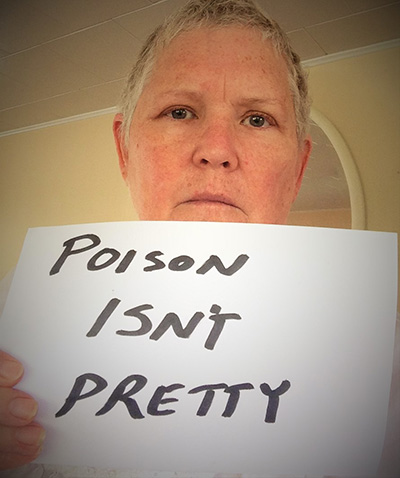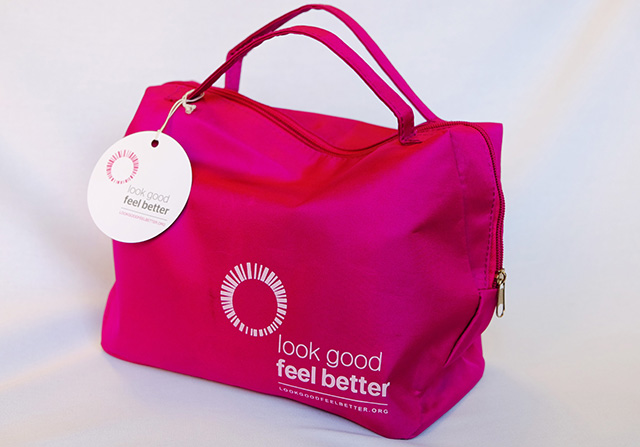I was diagnosed with invasive breast cancer in December 2014. My whole world changed in 15 minutes. I underwent a bilateral mastectomy that same month and soon thereafter began chemotherapy.
Not long after I started chemo, my hair fell out. My eyebrows and lashes disappeared. I felt alone, scared and sick. It wasn’t pretty. I started noticing posters at my hospital advertising a program called Look Good Feel Better, which is run by the American Cancer Society and the Personal Care Products Council, which I learned later is the largest trade association for the cosmetic industry. The idea behind the program is to offer free beauty tips and complimentary makeup kits to women in cancer treatment.
The way the Look Good Feel Better program works is that member companies of the Personal Care Products Council, like Estee Lauder, Smashbox and Mary Kay, donate cosmetic products for the kits given to cancer patients like me. The American Cancer Society administers the program nationwide. Cosmetologists donate their time to run the workshops.
The American Cancer Society and cosmetics industry lobbyists are hiding behind marketing and PR ploys.
I decided to attend a Look Good Feel Better workshop mostly because I felt alone and thought it would be good for me to get out. Maybe I would meet some other women going through the same thing. Maybe I would learn to draw some eyebrows on that didn’t look fake. Perhaps if I dressed up nicely and put on some makeup expertly I would feel more “normal” – and it would help ease me through the pain of six-hour chemo treatments.
And indeed, the class attendees were women like me, who were undergoing cancer treatment, and had lost their hair – all of it. We learned how to wear wigs, tie scarves and apply makeup. We were also each given a bag of over a dozen different cosmetics products. I left the class feeling less alone and more prepared to face my treatment, but most of all, like somebody actually cared.
Quite by accident, while researching a safe sunscreen to wear during chemo, I discovered a cosmetics database that independently evaluates over 60,000 products for safety, including cancer risk. I decided to check out the products I had been given at the Look Good Feel Better class. I discovered that a majority of the products contained chemicals linked to cancer. And if that’s not bad enough, some even included chemicals that could interrupt the effectiveness of Tamoxifen – an oral cancer drug I take today and will take for years.
I was mortified. I threw the majority of the products in the trash and cried. I cried for hours. That was one of the most painful moments I have experienced since my breast cancer diagnosis.
 Katy Skahill expresses her outrage over the carcinogenic makeup that she received from the American Cancer Society. (Photo: Katy Skahill)I was in utter disbelief that I was invited to a workshop for cancer patients, told that I was cared about and then given a bag full of potentially harmful products. I did some research to find out how such an unethical practice could be taking place and, in the course of doing so, learned that others were already engaged in efforts to challenge these “pinkwashers” – the corporations and organizations that peddle products linked to breast cancer while claiming to care about women with the disease.
Katy Skahill expresses her outrage over the carcinogenic makeup that she received from the American Cancer Society. (Photo: Katy Skahill)I was in utter disbelief that I was invited to a workshop for cancer patients, told that I was cared about and then given a bag full of potentially harmful products. I did some research to find out how such an unethical practice could be taking place and, in the course of doing so, learned that others were already engaged in efforts to challenge these “pinkwashers” – the corporations and organizations that peddle products linked to breast cancer while claiming to care about women with the disease.
Much of this activism has been coordinated by Breast Cancer Action, a grassroots education group that is calling on the American Cancer Society and the Personal Care Products Council – industry giants that claim to care about women like me – to stop this shameful pinkwashing. I decided to get involved in the group’s “Poison Isn’t Pretty” campaign, demanding that the American Cancer Society and the Personal Care Products Council refuse to allow companies to participate in the Look Good Feel Better program if they make products with chemicals linked to increasing our cancer risk, and risk of recurrence, by interfering with our cancer treatment.
The American Cancer Society has issued a seemingly cynical response to the campaign, stating that they believe the “benefits of Look Good Feel Better outweigh the minimal risks.”
I was betrayed by a program I trusted: a program run by the largest cancer charity in the nation.
This comes right out of the cosmetics companies’ playbook. They claim that exposure to chemicals linked to increased cancer risk at low doses, like those found in these makeup kits, is harmless. But a growing body of scientific evidence points to the role of carcinogens and hormone disrupting chemicals – even in low doses – in increasing women’s risk of cancer and recurrence. And a new study recently found that a group of common chemicals used in cosmetics can stimulate breast cancer even more than previously thought. These chemicals are absorbed through the skin and mimic the hormone estrogen, which causes cells to multiply and increases breast cancer risk.
 The “Look Good, Feel Better” kit. (Photo: Katy Skahill)
The “Look Good, Feel Better” kit. (Photo: Katy Skahill)
It is not the American Cancer Society’s role to evaluate my risk and make that decision for me. I expect them to set the highest of standards. Not hide behind the lowest.
When I saw their response, I was outraged once again, but this time also deeply saddened. I thought that once this practice of giving toxic cosmetics to cancer patients was pointed out in the media, and it was shown that people strongly objected to the practice – and that the objections were evidence-based – that these organizations would do the right thing. Instead, the American Cancer Society and the lobbying arm of the cosmetics industry are hiding behind marketing and public relations ploys.
For its part, the Personal Care Products Council issued a press release claiming that all of its products comply with current Food and Drug Administration standards. This is ludicrous because these standards are so weak, not to mention outdated, that companies are not even required to demonstrate a product is safe before it lands on store shelves – or in makeup kits. And the Personal Care Products Council spends millions of dollars lobbying against cosmetic safety regulations to make sure it stays that way.
These pinkwashers’ poor excuses are unacceptable. It has been six months since I discovered the harmful chemicals in the makeup kit I was given, but I’m still furious that I was betrayed by a program I trusted: a program run by the largest cancer charity in the nation. I have made phone calls and written dozens and dozens of emails, blog posts and Facebook posts to stakeholders of the program.
A hurt like this is not so easy to heal, especially when these pinkwashers go on denying the truth. I’m working to keep the pressure on them so no woman will have to experience what I went through. Now that’s what would really make me feel better.
Join us in defending the truth before it’s too late
The future of independent journalism is uncertain, and the consequences of losing it are too grave to ignore. To ensure Truthout remains safe, strong, and free, we need to raise $44,000 in the next 6 days. Every dollar raised goes directly toward the costs of producing news you can trust.
Please give what you can — because by supporting us with a tax-deductible donation, you’re not just preserving a source of news, you’re helping to safeguard what’s left of our democracy.
